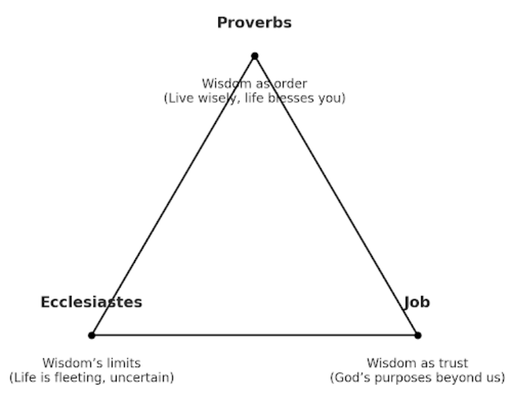
An Introduction to Biblical Wisdom Literature
We all long for the good life. The world offers countless, and often conflicting, suggestions about how to attain it. We’re told there’s security in wealth, fulfillment in success, satisfaction in pleasure, or that life’s true meaning is found within ourselves. Unfortunately, all of this searching for happiness and contentment through worldly, self-serving pursuits does nothing but leave us frustrated, exhausted, and empty.
The wisdom literature of the Bible points us in a radically different direction. While the world tells us the good life comes through wealth, success, pleasure, or self-discovery, God’s Word offers a deeper and truer vision. The Scriptures teach that a good life is not achieved by chasing after all that glitters then fades, but by aligning our hearts, minds, and actions with God’s wisdom. To live wisely is to live in step with God’s created order, learning to see life as He designed it, and walking in reverence and obedience to Him. This harmony with divine wisdom is what brings true flourishing and contentment. Embracing God’s wisdom offers so much more than just temporary happiness - It sets us on the path to a life rooted in purpose, meaning, resilience, and hope.
Wisdom is not gained all at once, nor is it simply intellectual knowledge. It gradually takes shape within us through a lifetime of right action, reflection on life’s limits and uncomfortable truths, and through struggling in the midst of deep suffering. The core wisdom books of the Bible, Proverbs, Ecclesiastes, and Job, invite us to walk the difficult road of a lifelong journey to true wisdom. Though distinct in voice and themes, they all align to teach us that a life lived apart from God will ultimately be futile and meaningless. To build our lives on our own limited understanding is to choose waywardness, cynicism, and despair. Instead, a life of true abundance and peace can only come by learning to fear the Lord and living in humble obedience to His divine will.
This series of twelve posts will guide us through Biblical wisdom literature and teach us to seek truth, wrestle with life’s hardest questions, and trust God’s purposes in every time and through every season of life.
The Purpose of Biblical Wisdom Literature
Unlike other parts of Old Testament Scripture that focus on Israel’s history or covenant law, wisdom literature speaks to universal human experience. It teaches us how to live well in God’s world by reflecting on justice, integrity, human limits, and the often mysterious nature of suffering.
Key themes of wisdom literature:
- The Fear of the Lord – Reverence for God is the foundation of true wisdom.
- Justice and Righteousness – The wise life is marked by integrity and compassion.
- Life’s Shortness – Earthly pursuits are fleeting; only God gives lasting meaning.
- Human Limitations – We cannot grasp all of God’s ways.
- The Reality of Suffering – Even the righteous may suffer for reasons beyond human understanding.
Wisdom literature doesn’t flatten life into formulas or pretend to offer simple answers to difficult problems. Instead, it acknowledges life’s complexity and invites us to walk humbly before God and trust Him because we are limited creatures, incapable of seeing the whole picture.
Three Books, Three Voices
Proverbs – The Path to Wisdom
“Choose my instruction instead of silver, knowledge rather than choice gold, for wisdom is more precious than rubies, and nothing you desire can compare with her.” - Proverbs 8:10-11
The Book of Proverbs is full of practical sayings and instructions, teaching us that God’s world runs on moral order and cause-and-effect. Wisdom is the ultimate skill for living well; those who pursue it usually find blessing, while the folly of those who don’t leads to ruin. Its tone is accessible and optimistic, presenting wisdom as the art of aligning life with God’s ordered design.
Ecclesiastes – The Limits of Wisdom
“Then I applied myself to the understanding of wisdom, and also of madness and folly, but I learned that this, too, is a chasing after the wind. For with much wisdom comes much sorrow; the more knowledge, the more grief.” - Ecclesiastes 1:17-18
The Book of Ecclesiastes pushes back against the easy optimism of Proverbs, offering somber, even cynical, reflections on the nature of our human existence. It reminds us that life is fleeting, often unclear, and impossible to grasp. It cautions us that wisdom alone cannot solve the impermanence of mortality or guarantee happiness or lasting success. Through its sobering reflections, Ecclesiastes invites us to contemplate the uncomfortable realities inherent to human existence and reminds us that true meaning in life can only be found through humbling ourselves before God and obeying His commandments.
Job – Wisdom Through Suffering
“To God belong wisdom and power; counsel and understanding are his.” - Job 12:13
The Book of Job confronts the oft-debated problem of pain and suffering. Job presents the story of a righteous man who loses everything on earth that is dear to him. As he laments his misfortunes and his friends wax poetic from a simplistic, Proverbs-like cause-and-effect logic, God reveals that His wisdom and purpose far surpasses human understanding. Job teaches us that wisdom means trusting God even when life feels incomprehensible and completely unfair.
How Proverbs, Ecclesiastes, and Job Balance Each Other
- Proverbs – The Voice of Order and Instruction
- “The world runs on God’s moral order. Live wisely, work hard, speak carefully, and life will generally go well.”
- Represents the baseline expectation for the course of human life – wisdom works, foolishness fails.
- Ecclesiastes – The Voice of Reflection and Skepticism
- “But, life isn’t that simple. You can live wisely, yet still die, lose everything, or face injustice. Human striving is like chasing the wind.”
- Pushes back against the sometimes simplistic, cause-and-effect view of Proverbs.
- Reminds us that wisdom is a good but not ultimate guide for living — God alone is capable of giving our lives true meaning and purpose.

3. Job – The Voice of Struggle and the Mysterious Ways of God
- “Sometimes the righteous suffer terribly for reasons they can’t understand. Wisdom means trusting God’s purposes even when they remain hidden.”
- Balances out the extremes of Proverbs and Ecclesiastes:
-
- Against Proverbs-only thinking: Suffering and calamity aren’t always the direct result of our own actions.
- Against Ecclesiastes-only thinking: Life’s toil and struggles aren’t arbitrary or meaningless, God’s wisdom and purposes are just higher than our own.
- Against Proverbs-only thinking: Suffering and calamity aren’t always the direct result of our own actions.
The Conversation Between the Three
- Proverbs: Encourages us — “Live well, and life will usually bless you.”
- Ecclesiastes: Cautions us — “Don’t expect too much from the things of this world because everything is ever-changing and fleeting.”
- Job: Challenges us — “Even when life feels unfair and painful, trust God’s higher wisdom and purpose for your life.”
Together, they give a full image of what wisdom is:
- True wisdom is reverence for God, faith in His justice and goodness, and humility about our human limitations.
Although wisdom is foundational to living a good life, Biblical wisdom literature continually reminds us:
- Wisdom is valuable, but possessing it doesn’t guarantee anything in life.
- Life’s mysteries can’t always be solved by human reason.
True Wisdom: Looking Upward
In a world obsessed with inward-focused self-help, Biblical wisdom literature is the ultimate self-help guide precisely because it is not about looking inward. Instead, it calls us to turn our gaze upward toward God, the source of all wisdom.
The good life is not built by our own cleverness or strength, but by humbling ourselves under God’s mighty hand and aligning our hearts and minds with His wisdom. When we fear the Lord, when we walk in obedience to His commandments, when we learn through our actions, contemplation, and even suffering, we are shaped into the people God designed us to be.
That is the path of wisdom - the path to the good life.
As we step into the wisdom books, we discover that they are not simply about clever sayings or moral advice but about aligning our lives with the very wisdom of God Himself. In the next post, we’ll begin with the Book of Proverbs and its foundational truth that life is ordered with justice and purpose. Wisdom is not abstract, it is personified, calling us to choose her way over the path of waywardness. We’ll explore how righteousness leads to a life of purpose and flourishing, while folly leads to sorrow and brokenness, and how this cause-and-effect pattern is woven into the fabric of creation itself. Join us as we embark on our journey down God’s path to a wise and fulfilling life.
Add comment
Comments
These passages mean so much to me. Ive always loved Poverbs and Eccleseasties .At 71yrs these squiptures have always sustained me. One of my favorite pastors once said," I feel every one should read one verse of Proverbs a day. As I look back on my life it is quite clear the wisdom I have gained and the wisdom that is too come. I gained some today. As we mature as women, let's be open to wisdom. The way you see things today will not be the same as tomorrow.
Amen, Katherine. Our viewpoints often shift as we grow amid life’s continual changes. Our understanding is so limited, but the more we align our hearts and lives with the wisdom of God’s word, the more we grow into the people God wants us to be. I pray you will be blessed and grow in wisdom as you read this series.